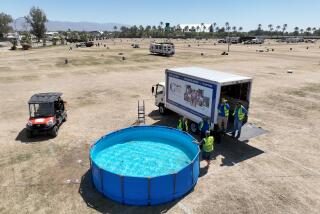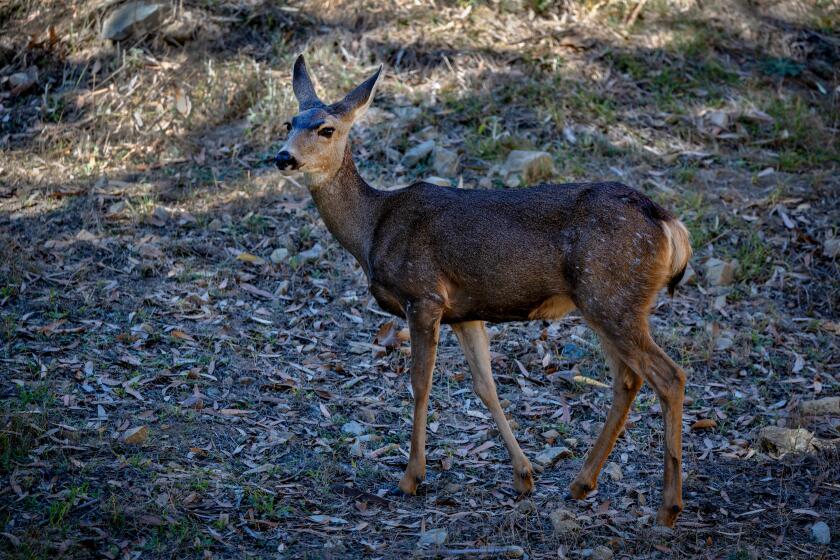More Aerial Spraying Unlikely : Another Medfly Surfaces
Agriculture officials do not think additional aerial applications of pesticide are needed in the San Fernando Valley despite the new discovery of a Mediterranean fruit fly one-quarter mile outside the zone sprayed by helicopters Monday.
Officials ordered ground spraying Tuesday afternoon in fruit trees in the Reseda neighborhood where a mature, unmated female--the fourth fly found in a week--was discovered late Monday in a trap set in a back yard peach tree.
“We don’t feel this warrants another air application at this time,” said William Edwards, chief deputy for the Los Angeles County Department of Agriculture. The fly was found southwest of the area that helicopters sprayed with the pesticide malathion Monday. The zone is bordered by Sherman Way, Haskell Avenue, Devonshire Street and Wilbur Avenue.
“It’s no surprise we found an additional fly,” Edwards said. “We are going to continue to monitor the traps in the surrounding area and wait and see what happens.”
He said additional aerial spraying would be considered if, for instance, several more flies were found farther away from the infestation zone. “I don’t know if that will happen and trying to predict these things is hard,” he said.
Agriculture officials have placed 100 small, triangular cardboard traps per square mile in the infested area--traps that contain an odor that lures male flies.
The trapping of three female flies indicates a significant infestation because females are not normally attracted to the scent, Edwards said. The fact that the fourth fly had not mated was slightly reassuring because the insect had not deposited larvae in the ground.
State and local agriculture officials are expected to announce a quarantine zone in the West Valley by the end of the week. Residents will be asked not to take fruit and vegetables outside the zone, and nurseries will be required to strip fruit from trees before sale.
Edwards said it is unlikely that inspectors will be stationed in the zone. Violation of the quarantine would be a misdemeanor criminal offense.
The eradication of the pest, which attacks more than 200 varieties of produce, will continue next week with the release of 20 million sterile male flies. The massive infusion greatly reduces the chances that female flies will mate with a fertile fly during their 23-day life span.
The discovery of the first two female flies last Wednesday indicated a large infestation and prompted Gov. George Deukmejian to issue a declaration of emergency to allow for the spraying. A third fly, a male, was found Monday morning inside the infested area.
Beginning at 10 p.m. Monday, two low-flying helicopters sprayed 990 gallons of syrupy bait laced with malathion over a 16-square mile area of Northridge, Chatsworth and Reseda.
County health officials said they received about 300 calls Monday from concerned residents mainly with questions about what to do before and after the spraying. Over the weekend, more than 40,000 instructional leaflets had been distributed.
Residents were instructed to cover cars and put patio furniture indoors because the bait could leave stains. Also, they were advised to cover pet-food bowls and fishponds, and as a precaution, hose down the yard in the morning.
On Tuesday, telephones were “astoundingly quiet,” said Dr. Paul Papanek, chief of toxics and epidemiology programs for the county. He said two people called to report upper respiratory soreness and were advised by medical officials to see a doctor if their conditions persisted.
“It was hard to know precisely if they could be linked to the exposure,” he said. “It’s a small enough number that it does not represent any pattern for illness.”
Papanek said the amount of malathion in the bait is “so diluted that health effects are just not there. If a child licked off all the material that fell on 10 square feet, even that would not be anything approaching a toxic dose.”
Just the same, Jody Wali, 32, of Northridge, whose wife is pregnant, said he turned off his air conditioner Monday night so as not to bring in outside air.
“I thought all the information they gave was informative,” Wali said. “We didn’t feel it was necessary to contact our doctor. I didn’t think this was any different than going to the store and buying spray for your back yard.”
Dorothy Dennis, 61, of Reseda, whose home is near the house where the fourth fly was found, welcomed county workers armed with malathion spray. Dennis has several peach, apricot and orange trees in her big back yard.
“I really don’t have any concerns about this,” she said. “I know this is a rather dangerous pest. How else can they control it? I’ll just wash all my fruit as always.”
More to Read
Start your day right
Sign up for Essential California for news, features and recommendations from the L.A. Times and beyond in your inbox six days a week.
You may occasionally receive promotional content from the Los Angeles Times.






